Robert Woodruff, PA-C, is a member of MEDEX Seattle Class 1 (1969), MEDEX Northwest’s first graduating class, and has remained a good friend and supporter of MEDEX Northwest in the 55 years since. Like virtually all of his Class 1 classmates, Bob served in the Vietnam war. He was an Army Special Forces Medic, an experience which led him, much to his surprise, to the University of Washington’s startup project MEDEX Northwest, and to the very inception of the PA profession. His was a long and successful career as a practicing PA in Eastern Washington and the Pacific Northwest, one marked by a commitment to community and to helping those most in need. We recently had the pleasure — always a pleasure — of catching up with this MEDEX hero and PA pioneer. We asked him to consider the possible connections of his Vietnam experiences to the professional that he became. We wondered what this newfangled and unproven thing called MEDEX Northwest must have seemed like to him and his fellow classmates at the time? We asked him to reflect on the state of the hugely successful PA profession today in light of his story. And of course, we laughed. Enjoy the conversation.
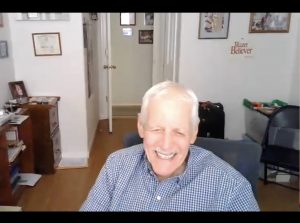
MEDEX: It’s great to get the chance to meet up again, Bob. Thank you so much for taking the time – and for wrestling with Zoom! – to make this happen.
Bob Woodruff: Hey, I’m happy to do it.
MEDEX: I thought we might start out by watching together a brief collection of clips that I’ve pulled from a video we produced several years back and that you appeared in. It’s called The Next Mission: MEDEX and the Military (2015). Do you remember this video?
Woodruff: Well, maybe.
MEDEX: Why don’t I read aloud the introductory blurb that accompanies the video to help us both remember what it’s about:
This video follows four current day PA students from MEDEX Tacoma Class 1 (2015) as they transition from their time as medically trained military personnel during the time of the Iraq and Afghanistan conflicts into their new careers as civilian PAs. In contrast, we hear from several members of MEDEX Seattle Class 1 (1969), each of whom came to this new profession following their military service during the Vietnam War. Each generation describes the role the military played in shaping their career in medicine, and how MEDEX Northwest and the PA profession answered that call.
Okay, let’s give this brief set of clips a look together.
[Reader, please click below to watch this 2:46 second collection of clips]:MEDEX: It’s really striking when watching this how visibly moved, even shaken, you appear to be as you think back on your wartime experiences. All these many years later, I can still see it in your face and hear it in your voice, even as you put it in such an understated way: “Yeah, that was quite the experience.” And of course it’s also quite sobering to be reminded through the battlefield images and statistics that follow just how dangerous and deadly this gig was for military corpsmen and medics and the like. It was war, after all.
So let me ask you, Bob, how is it that you stuck with it when you returned from your tour of duty to the States? How is that you stuck with the idea of being involved in healthcare, pursuing a career in medicine? Surely there were those among you who simply had enough after their time in Vietnam was up, and who wanted nothing more to do with it. But not you, apparently.
Woodruff: Well, remember that there was so much training with the Special Forces before going to Vietnam. I was drafted into the Army, okay? I remember sitting with my dad asking, “What the hell am I going to do?” He told me to try to get into something that would give me the best schooling possible. I did basic training with everyone else, took some tests, and qualified for specializing in either foreign language or medical. The medical was something like 44 weeks of training, which was for me: the longer the training, the longer I could stay out of combat! There was a lot of bookwork, a lot of hands-on stuff, dog camp, all of that.
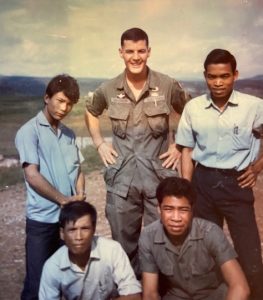
So, when you came home from Vietnam, you kind of said, “Well, I have these skills, okay?” Particularly the suturing and wound care and that type of thing, plus the underlying medicine that we learned there in Vietnam, the diseases that we saw there, the things that triggered them. Combat medics were like paramedics now, trained in emergency response.
So I went to community college when I got back and started taking anatomy, physiology, and that sort of thing, because I had this little twinge that maybe I wanted to go to medical school. But for somebody who was, I don’t know, 22 years old, 23 maybe, it was overwhelming. Taking the prerequisites, getting accepted into medical school with my past, it was hard, you know?
And then Dr. Smith and others started this program up at the University of Washington. They were saying “we can use these people who had this training and this opportunity in Vietnam to care for these people. We’d like to put these people to work in communities.” And well, you know the rest of that story. Somebody called me and I got on an interview list. I thought “there’s no way they’re going accept me,” you know? But then I went to the interview and met all these guys … I don’t know how many there were, 50 people or something like that? And they accepted me!
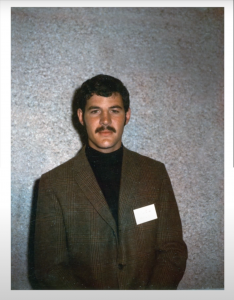
MEDEX: If you look back on it and maybe put yourself in the position of Dr. Smith and his team, what do you think they saw in you, Bob Woodruff?
Woodruff: [laughing] I’ve thought about that! We were just kind of wild and crazy, you know? Like every other person that came back from Vietnam. But really, I think they saw that we had this training, that we went to Vietnam and got through it, and that we did a good job at it too, you know? They wanted to take our experience, add additional training and more didactic stuff, and get us out into the rural communities to see if we could help that old doc who was working seven days a week.
MEDEX: Yes, there was certainly a real need out there. But let’s flip the coin. There you are, one of the 12 men who ended up graduating as MEDEX Class 1. What did MEDEX, I guess you could say the idea of MEDEX, what did it all seem like to you at that time, at the beginning? Did it seem like it might be a fly-by-night operation? Something a little risky to get involved with? Something you were willing to try out because, well, what the hell? Or did it seem like, wow, this is really going to happen?
Woodruff: Well, I think it was just, “Hey, I think I’ve got a career here!” It was like, I’m going to go out there and try to do the best I can and hopefully get with a group of docs that will help me through this transition. And that’s what it turned out to be. In other words, it looked to me back then like if I do well and if I continue, I’m going to come out of it with a career! And back then, careers weren’t guaranteed, you know, particularly with people that didn’t have four-year degrees, people like me.
MEDEX: So, from the get-go, MEDEX held that promise for you.
Woodruff: Yes. Way back then, I worked with some tremendous family physicians. This was at the Cheney Medical Center [now Multicare Rockwood Clinic – Cheney]. I’d go on rounds with them at the hospital early in the morning, that type of thing, then get back to the clinic and do those kinds of things. And they gradually worked into having patients see me. We’d see them together and they would introduce me to the patients. “Mr. Woodruff is a Vietnam vet,” the doc’d tell them, “and he was trained at the University of Washington to be a physician’s assistant. And if it’s okay with you, he’s going to see you.”
During the first-year training process, they would critique us, sometimes with the patient in the room and sometimes outside the exam room or at the end of the day. So it just kept evolving. I’d see more and more things, and go, oh yeah, I know what to do now. Sometimes the doc would say, as far as like suturing or something like that, he’d say, “He does a better job than I do.” And you know, it all worked out. That’s all I can say.
MEDEX: Yeah, that’s for sure. And so, when the training period was over and you stayed on that practice as a practicing PA, was there something that marked the difference for you? Did you feel like a … well, feel like a PA? Because “physician assistant” was a brand-new idea then, right? There wasn’t anything like it before you guys, at least out on this coast. So how did you know that you were a PA? What did that transition feel like to you?
Woodruff: It felt like having a salary! [laughter]. I became a member of the family practice group that I had trained with, you know? My name was listed there on the side of the building or in the advertisements or whatever. I became a guy who was part of that practice.
MEDEX: Right. And did that make you feel … what’s the word … legitimate? Did you feel legitimate in your new position? I’m thinking of another section of the video we looked at earlier, where your MEDEX classmate Steve Turnipseed reflects on his return home from Vietnam to Oakland. Like so many Vietnam vets, he was not welcomed home with open arms, to say the least. Far from it. And he didn’t have many job options, wound up like so many others emptying bed pans and the like. Of course, it was the same for you, coming back home from this wild, intense, not a wholly supported war, not sure at all what was to come next. So, I guess what I’m asking is, against that background, did you suddenly feel that you had transitioned into something, you know, legit? Into not just a job but a real profession and a new identity?
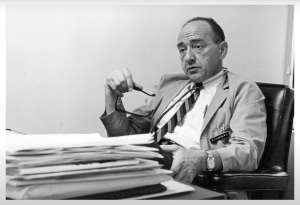
Woodruff: Well, I can tell you that it was all up to the docs that you worked with. They’re the ones that introduced you to the community. I think especially of a gentleman by the name of Dr. Willie Gamon. He was a real pioneer in all of this. Dr. Gamon went out to the community and gave talks at Lions Clubs, those type of things, and he would take me with him and introduce me. And it all eventually just kind of came together, you know? Yeah, we had those times thinking, “I don’t know if this is going to work,” right? I didn’t know if I was going to be accepted. But I was accepted. Was it better in a small community rather than a large community? I’m not sure.
MEDEX: And did that feeling of acceptance that you were looking for and that you received over time come from your patients, from the community, or from your colleagues in the clinic, the docs and nurses and staff and those folks. Where did that feeling of acceptance come from?
Woodruff: Well, I would say it came mostly from the physicians that I worked with. Maybe it was a little bit slower in coming from the community. The hospitals didn’t seem as accepting as the family practice setting did, though after a while, of course, we had privileges at the hospital to assist in surgery, do rounds, that type of thing. Maybe some of the nurses, before they started the nurse practitioner program, some of them found me to be a burr in their saddle.
MEDEX: So, you continued working in Cheney, staying on with your preceptor who now had become your colleague, really. What was your trajectory from there?
Woodruff: After about 10 years, I had this wild feeling that maybe I should go back to school and try to get through medical school. So, I left the Cheney Medical Center and went back to Washington State University (WSU) for four years or so. But the chemistry and all that kind of got to be too much for me. The person that the Cheney Medical Center had hired to replace me when I went off to school didn’t work out too well, the position became open became again, and so I went back to work and didn’t leave again. I think I worked there for 22 years all tolled.
Later, my mom, who lived in Portland, Oregon, became ill, so I took an opportunity at the end of those 22 years to move to that area. I got hired on with the Kaiser Permanente Northwest Vancouver Medical Office in Vancouver, WA [closed in 2012] and I worked for them for something like another 15 years.
MEDEX: Still in a family medicine setting?
Woodruff: We had minor injury clinics back then, like urgent clinics today. A PA would usually be assigned to a minor injury clinic. You know, the sprained ankles, the lacerations, the small trauma type of things, we’d see them. They’d either come in on a walk-in basis or maybe have an appointment from previous injury that you’re rechecking, that type of thing. So that was it. Minor injury was kind of our bread and butter if you want to call it that.
MEDEX: Let’s see, at the end of your 15 years working for Kaiser Northwest Permanente out of Vancouver, you volunteered at the Free Clinic of Southwest Washington for, what, another ten years?
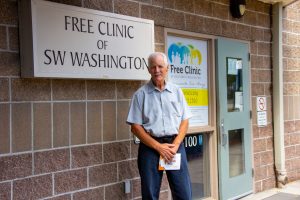
Woodruff: Yes, from 2011 to 2021. I was introduced to the Free Clinic just after I retired. A retired doc took me over there and introduced me around. He told me that if I could do a couple of nights a week, it would really be helpful. And so I did. The patients were tremendously thankful, these people that didn’t have medical insurance, didn’t have, you know, the means to be seen in the emergency rooms and that type of thing.
MEDEX: No doubt you did great work there, Bob. You stayed with it for 10 years, after all, so something must have been going right! But here’s a question that comes to mind, given our earlier talk about Vietnam: is volunteering this way just something in your nature? Or could we suppose that your experiences in Vietnam had something to do with it? That they shaped you in some way that would lead you to volunteer your time and effort that way after a what was already a full career?
Woodruff: Hmmm … well yes, the Vietnam experience was about helping people who had no one else to help them. In some of these villages, they didn’t have anybody who could see them, not anybody who, you know, could maybe get them some help. And at the Free Clinic, the people who work there, they are all volunteers, the nurses, the medical assistants, doctors from different fields, they would give their time. Working with these patients was just tremendous because, you know, nobody got paid, and the patients were overwhelmingly thankful. And that alone was reason to keep going, to keep seeing patients.
MEDEX: That’s interesting. Would you say this was a high point of your overall career?
Woodruff: Oh, let me see. Well, it was great as far as transitioning to retirement because it gave you this feeling of helping somebody while cruising into complete retirement. And I was able to use my Spanish.
MEDEX: When did you learn Spanish?
Woodruff: I was traveling before I retired, and some of the places that I went to didn’t speak very good English. And so I took some night school at the community college. And my brother was a retired Spanish teacher. He often traveled with me. So, you know, the Spanish came along. I don’t speak it very well, but I speak enough that the patients they understand me. Between their English and my Spanish, we made things happen.
MEDEX: So Bob, let’s think about numbers here for a second. This past summer, MEDEX admitted our 57th class here in Seattle, the 27th class on the Spokane campus, the 15th Anchorage class, the 11th Tacoma class, and the 4th class on the newest campus in Kona. To date, MEDEX has graduated over 3000 PAs. There are over 158,000 PAs practicing in the U.S. currently. And there are 254 accredited PA programs operating currently, of which MEDEX is but one. How do these numbers strike you, Bob Woodruff, one of the very first PAs ever!
Woodruff: Well of course PAs and nurse practitioners nowadays are completely different than the 12 of us who went through the first class of MEDEX were. I mean these were all guys with no thorough or complete experience, just experience in one thing or the other. Now the MEDEX program takes students with much more medical background and much more college learning, okay? It’s different. In our day we combined our combat experience and our training in special forces with community medicine and family practice. And so we were a different breed.
MEDEX: That’s true. But those of us who write the histories of these things like to make the claim that if it weren’t for you and John Betz and Paul Snyder and Mark Patterson and Steven Turnipseed and that whole gang in MEDEX Class 1, had you not been successful, had you headed out there to make a difference but it just didn’t work, then MEDEX Northwest, and even the PA profession itself, may not have succeeded to the extent that the numbers I just read you indicate it has. What do you think of that?
Woodruff: Well, I think that the product or the output that they have now is better than we had, because PAs today can do more of the general medicine type thing than we were able to do. We were more tuned to the trauma setting, that type of thing. And we incorporated the medicine with the training that we had already had in the service.
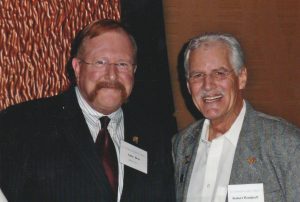
MEDEX: Let me push you on this just one more time. When you hear the phrase “We stand on the shoulders of those who came before us,” well, that’s you, Bob! That’s you and John and Paul, all of you guys. It’s your shoulders being talked about! How does that feel to you now, all these years later, as one of the last men standing from that first class? Do you accept that acknowledgment of your historical importance? Do you take it on? Or do you just try to deflect it?
Woodruff: I just kind of deflect it, I guess. And to tell you the truth, I have this kind of queasy uncomfortable feeling inside me when I think that I’m one of the last ones of my class who is still alive. I don’t have those guys talk to anymore. I can’t give them a call and talk to them. I don’t know, I just kind of feel uncomfortable that all these guys, the friends that I had, are gone.
MEDEX: Yes, you must miss them very much. One final question, one which echoes some of things we were talking about earlier: is the PA profession an honorable profession in your view?
Woodruff: Is it honorable? Well, what do you compare it with? Yes, I do think it’s honorable. Because, yeah, you get this feeling you’re helping people, right? And you’re working with other people with similar backgrounds. And there’s a slot. There’s now a slot for PAs and nurse practitioners. It’s a good feeling for me to be able to say, “Yeah, I was a professional. I was a physician’s assistant. And before that, I was a combat medic. I meant something to the community.” I think you could say that.
MEDEX: I think you can most certainly say that. Okay, lastly, I’m going to show you two photographs. The first is the well-known photo of Dr. Smith (MEDEX founder), Dr. Raymond Vath (MEDEX Community Psychiatrist) and Dr. Gerry Bassett (MEDEX Deputy Director) standing with you and your Class 1 mates on the steps on the UW campus in 1969:
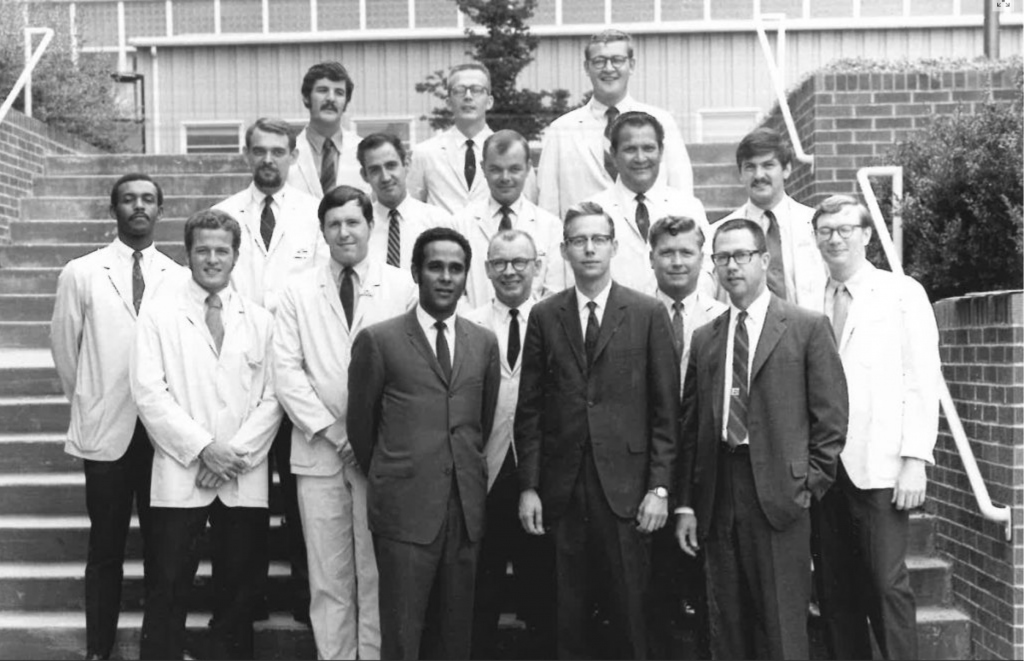
And here is the second photo I want to show you:
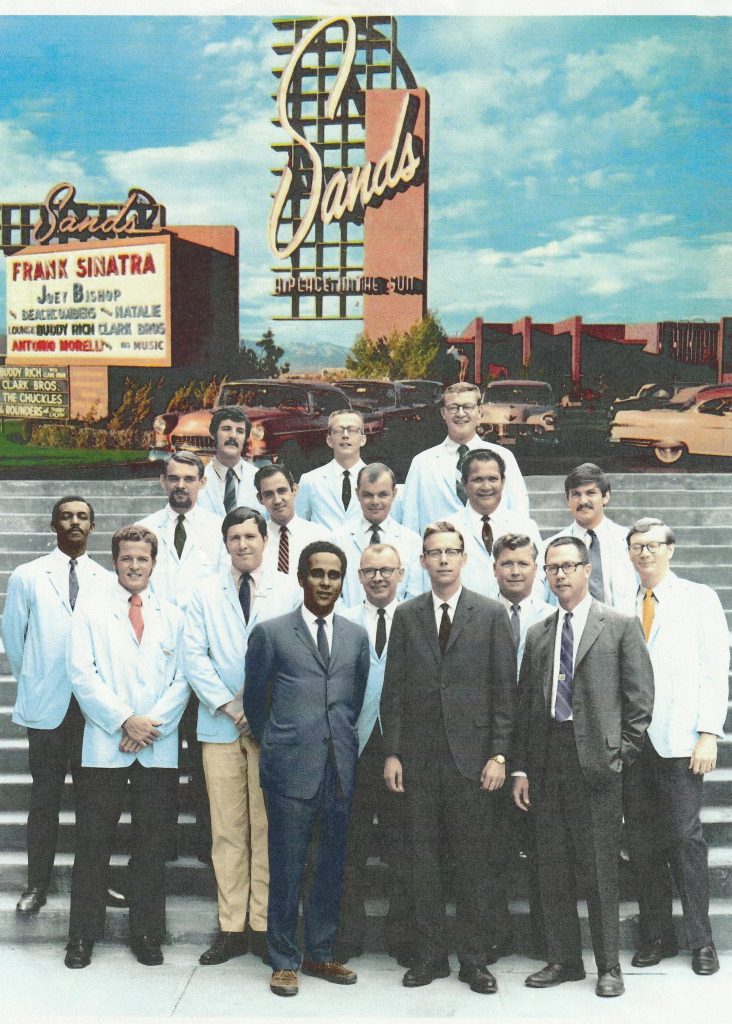
Woodruff: [laughter] What in the world!?
MEDEX: Let me explain. Our team here at MEDEX Communications has always thought of you guys in Seattle Class 1 as, you know, as cool dudes, as rock stars, right? So, one day someone on our team applied his Photoshop skills to colorizing and moving the whole lot of you from the steps on the UW campus to the steps of the Sands Hotel in Vegas! Maybe even as the opening act for Frank Sinatra!
Woodruff: [laughter] Oh wow, look at that. Frank Sinatra!
MEDEX: It’s a funny pic that is still pinned up in our office. But what I really want to tell you, Bob, is that while we’re joking around with this image, we are also sort of not joking around. We really do hold you in that regard! You guys really are PA rock stars! And we really do think that the entire PA profession has you to thank.
Woodruff: Well, I guess it all worked out.

